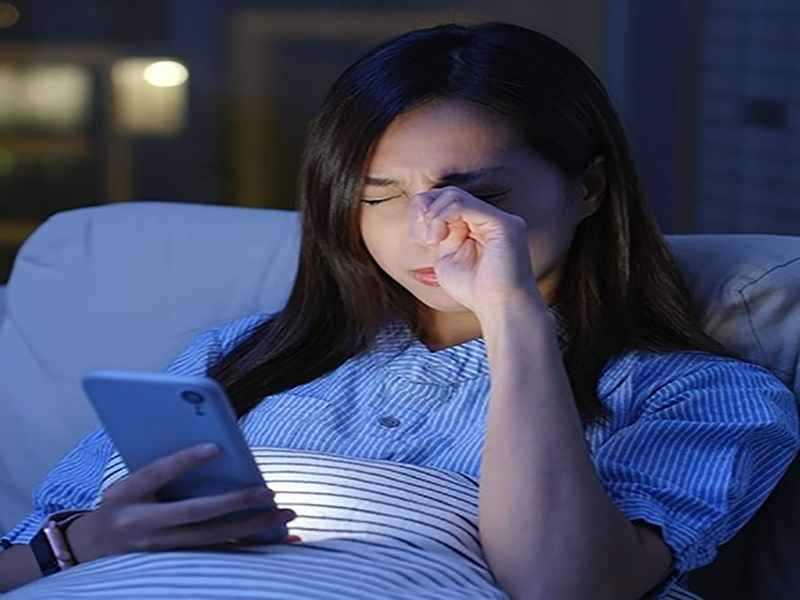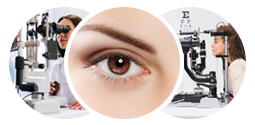

In today’s digital age, mobile devices have become an integral part of our daily lives. From communication to entertainment and work, smartphones and tablets serve multiple purposes. However, excessive use of these devices can have detrimental effects on both eye health and overall well-being. The impact extends beyond just vision problems to serious health concerns, including sleep disturbances, mental health challenges, and physical ailments.
Prolonged screen time causes discomfort in the eyes, leading to symptoms such as dryness, irritation, blurred vision, headaches, and difficulty in focusing. Digital Eye Strain (DES) or Computer Vision Syndrome (CVS) occurs due to continuous focus on a screen, reduced blinking, and exposure to blue light. The strain increases when using mobile devices in poor lighting conditions or at incorrect angles.
Mobile screens emit blue light, which penetrates deep into the eye and can cause retinal damage over time. Excessive exposure to blue light is linked to an increased risk of macular degeneration, which can lead to vision impairment and even blindness in severe cases. Additionally, blue light exposure disrupts circadian rhythms, making it harder to fall asleep.
Staring at mobile screens reduces the frequency of blinking, leading to insufficient lubrication of the eyes. This results in dry eyes, redness, discomfort, and sometimes a burning sensation. Prolonged dry eye conditions can lead to more serious ocular surface diseases and complications, requiring medical intervention.
Studies suggest that excessive screen time, especially among children, can contribute to the development and progression of myopia. The constant focus on close objects strains the eye muscles and affects natural vision development. Research also indicates that myopia prevalence has significantly increased due to prolonged use of digital screens at a young age, reducing exposure to natural light, which is essential for healthy eye development.
There is emerging evidence that prolonged exposure to the blue light from mobile devices could contribute to the early onset of cataracts. Over time, oxidative stress from excessive screen exposure can damage the proteins in the eye’s lens, leading to clouding and vision impairment.
Using mobile devices before bedtime can interfere with sleep quality. The blue light emitted from screens suppresses melatonin production, a hormone that regulates sleep. This can lead to difficulty falling asleep, insomnia, and poor sleep quality, which, in turn, contributes to daytime fatigue, reduced concentration, and mood swings.
Excessive mobile phone use is associated with a sedentary lifestyle, reducing physical activity levels. Lack of exercise contributes to obesity, high blood pressure, and cardiovascular diseases. Prolonged screen use often replaces time that could be spent engaging in physical activities, leading to metabolic imbalances and poor heart health.
Frequent mobile usage, particularly social media engagement, is linked to increased stress, anxiety, and depression. Constant exposure to notifications, online comparisons, and screen addiction can negatively impact mental well-being. Social media addiction can also contribute to a decline in self-esteem, feelings of isolation, and an increased risk of mental health disorders.
Poor posture while using mobile devices can lead to “text neck” syndrome, characterized by neck pain, back pain, and spinal misalignment. Holding the phone for extended periods can also cause hand and wrist discomfort, leading to repetitive strain injuries such as carpal tunnel syndrome. Long-term poor posture can result in chronic pain conditions and decreased mobility.
The habit of using mobile devices while walking or driving poses a significant safety hazard. Texting or browsing while crossing the street can lead to pedestrian accidents, and distracted driving is one of the leading causes of road accidents worldwide. The constant need for digital engagement reduces awareness of the surroundings, increasing the likelihood of injuries.
While mobile devices offer convenience and connectivity, excessive use poses significant health risks. The harmful effects extend beyond the eyes to sleep quality, physical health, and mental well-being. By adopting healthy screen habits and taking necessary precautions, individuals can mitigate the harmful effects of mobile devices on their eyes and overall well-being. Moderation and mindful usage are key to maintaining good health in the digital era. Taking proactive measures, such as reducing screen time, practicing proper posture, and prioritizing eye care, can significantly enhance quality of life and long-term health.

We offer advanced treatments, expert consultations, and state-of-the-art technology to ensure your vision stays sharp and healthy. Book an appointment today and take the first step toward better eye health.